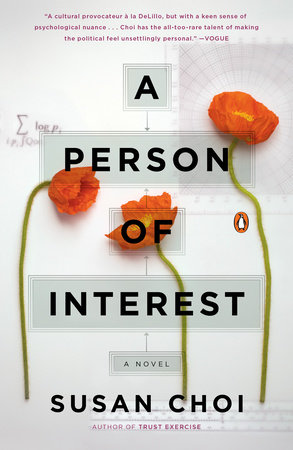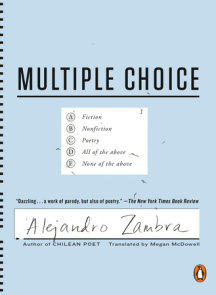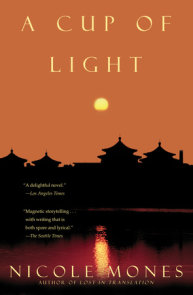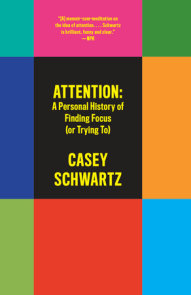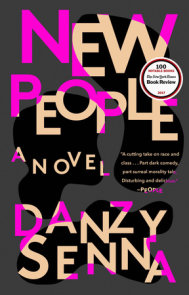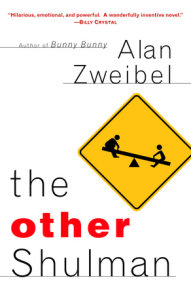READERS GUIDE
Questions and Topics for Discussion
INTRODUCTION
Almost no one in Susan Choi’s latest novel, A Person of Interest, ever calls the book’s protagonist anything except for his title, “Professor,” and his last name, “Lee.” An aging Asian-born mathematics professor with decidedly limited personal skills, Lee is a prickly colleague and a reclusive neighbor—seemingly the last person who might attract the attention of FBI agents investigating a series of terrorist attacks. However, when a professor in the office next to Lee’s, an outgoing, popular hotshot named Rick Hendley, becomes the latest victim of a technology-hating psychopath known only as the Brain Bomber, Lee’s detached response to the event and his persistent acts of social maladroitness lead not only the Bureau but also the national news media and his own close acquaintances to regard him with damning suspicion. In this lush, psychologically insightful novel, the outwardly mundane Professor Lee truly becomes a person of interest, not only as he relates to the government’s investigation, but also as a moving study in isolation and misunderstood emotions.
As the allegations regarding Lee multiply, the quiet professor becomes absorbed in his own theory about the bombings. His accusatory thoughts fasten onto Lewis Gaither, a graduate school colleague of bygone days whose wife, Aileen, fell into an adulterous affair with Lee. His religious and moral sensibilities enflamed by his wife’s faithlessness, Gaither fled the Midwestern university where he had been pursuing his doctorate, taking his and Aileen’s infant son, John, with him. Now, thirty years later, in the wake of the bombing of his colleague’s office, Lee receives a cryptic letter that seems to have only one explanation: the bombings are Gaither’s instrument of belated vengeance against the man who seduced his wife. Caught between his guilty recollections of the past and the hysterical suspicions of the present, Lee finds himself ever more on the defensive. While he parries the questions of the FBI and evades the piercing gazes of people who had never before so much as noticed him, Lee ransacks his memory for additional clues. Simultaneously, his conscience is besieged by two other mysteries: where is the boy whom Gaither fathered, and will Lee ever be reunited with Esther, the estranged, rebellious daughter whom Lee fathered with the now-dead Aileen?
Brilliantly acute in her observations of soul and society in the postmodern world, Susan Choi exposes the paranoid subtexts of American culture while she also sensitively considers the poignant struggles and frequent failures of an ordinary man to understand himself and to relate to the people around him. With unerring grace, she explores both the necessity of discovering oneself and the pitfalls of self-absorption. A novel about a man who can rarely find a suitable means of self-expression, A Person of Interest speaks eloquently of the pain of alienation, the harshness of societal judgments, and, thankfully, the slender but ever present possibility of redemption.
ABOUT SUSAN CHOI
The daughter of a Korean father and a Russian-Jewish mother, Susan Choi was born in Indiana and raised in Texas. She holds an undergraduate degree from Yale and an M.F.A. from Cornell. Her first novel,The Foreign Student, won the Asian American Literary Award. Her second novel, American Woman, was a finalist for the Pulitzer Prize. A Person of Interest is her third book.
A CONVERSATION WITH SUSAN CHOI
Q. Authors who depict the lives of nonwhites in America face some interesting choices: should they approach their characters’ experiences as the basis for a commentary on Americanness, as a means for exploring the problems of racial otherness, or to enable a less politicized inquiry into more universally human issues? In creating the character of Lee, which of these possibilities did you find particularly important, and why?
A. With this book, I was less interested in the condition of the character’s particular ethnicity and racial identity than in the general condition of being a non-native-born American in the sort of Americanness that only those born elsewhere can possibly experience. I didn’t want Lee to be Taiwanese or Korean or Chinese or anything more precise than a man born elsewhere, who had found in America the home denied him, for whatever reason, by his native country. I’m always distressed, lately, by how little native-born Americans understand the immigrants who come to this country. Often their ardor for our country, and their devotion to it, completely outstrip our own native-born sentiments. We take things for granted; and on top of that, we view outsiders, often, with suspicion. One irony of Lee’s situation is that for all his seeming suspectness to his “all-American” neighbors and colleagues, he is perhaps the most loyal American of them all.
Q. The themes of alienation and cultural paranoia are recurrent in your work. Why do you think you keep coming back to these problems?
A. I always do seem to be drawn to outsiders, whether they are people who have intentionally placed themselves outside the good graces of the law or people who, for all their attempts to blend in, are indelibly different from those who surround them, whether because of their origins, race, sensibility, or for some other reason. Outsiders are irresistible narrators. Their perspective on the world that excludes them is always bound to be keen. And, I suppose, writing about a person who is comfortable in his or her skin has never seemed very interesting to me. Marginal people tend to exist in a state of tension with the persons around them; sometimes that tension takes the form of paranoia, sometimes hostility. Either way, it’s good stuff for a novel. You need tension for drama.
Q. It seems that your novel, with its portraits of confused overachievers and social misfits, is responding to a set of contradictory demands that is woven into life in our times. We are encouraged to become “tall poppies,” as Frank Fasano calls them, while, at the same time, we are supposed to play well with others and fit into everyday society. Any thoughts about this conundrum of achievement and acceptance?
A.I’m just as besotted by charismatic iconoclasts as anyone, and I wonder, always, how such people transcend the stigma of being misfits to become cultural icons instead. And I’m especially interested when the person is a racial or ethnic outsider, when his or her pure quotient of extraordinariness is sufficient to outweigh disadvantageous differences from the cultural mainstream. Albert Einstein, whom Professor Lee venerates, is an example. In his youth Lee dreams of being an Einstein himself, and for me that dream is as much about Lee’s being an immigrant and an Asian as it is about his professional passion for mathematics. Einstein—an immigrant, a Jew—is particularly dear to a man like Lee, who is always going to be aware of his difference, his outsider status, his nonwhiteness, while he lives in America.
Q. Quite a few of us have met people like Lee—highly capable in a narrow field of expertise but awkward and reticent in their social relations. How have you arrived at your ability to write about such people with such evident sympathy and understanding?
A. I think that, deep down, I always feel more affinity for the misfits than for the socially dazzling. It might sound hackneyed to refer to childhood, but I’m still in some ways the kid who never wore the right clothes and was always picked last for the team, and was called by other kids “really smart” in tones that weren’t admiring, or cruel, but sort of distant and bewildered. In my first book the protagonist tells a new friend that most people “don’t know what to make of him”; I often felt that way myself, growing up. So I guess I find the extremely awkward deeply interesting, rather than pitiful or worthy of scorn. At risk of overstating my own awkwardness, which really was not terminal, I sympathize more easily with such people than with the boundlessly confident, or the shameless. Those are the people I can never understand.
Q.You seem to be attracted in your fiction to figures who enjoy positions of privilege or promise in society but then turn violently against the System. American Woman strongly resembles the real-life saga of Patty Hearst, and the bad guy in A Person of Interest is almost a clone of the Unabomber. Do you find yourself drawn to tell the stories of fortunate sons and daughters who dramatically reject their advantages?
A. In a word, yeah. Such people stand at the crossroads of so many conditions that really interest me: they’re privileged and charismatic, and they’re iconoclastic exiles. They’re the insiders who threw it all away and walked out. What made them do that? What unique dissatisfactions did they suffer as the result of all that privilege—whether of wealth, or position, or intelligence? I’m always drawn to violent stories of rejection. The corporate raider who suddenly dumps all his stock and moves into a shack in the woods. The prodigy who smashes his instrument and takes a job loading trucks. Even the seemingly happy wife and mother who abandons her family. I always wonder, What broke this person? Or, What are they fighting against?
Q.You have an unusual capacity for making rather unlikable characters appear sympathetic. Some of the characters inA Person of Interest do truly horrible things to each other, yet you manage to make even the worst of their actions seem understandable. Even the Brain Bomber becomes recognizably human. Do you think there may ever be such a thing as trying too hard to rationalize antisocial behavior?
A. No, because I don’t consider what I’m doing to be a rationalization. Reason and empathy are very distinct. With American Woman, for example, it was very important to me that readers grasp on a gut level why Jenny turns to violence; why, for a time, it makes sense to her. That’s different from trying to argue that her actions made objective and rational sense, with reference to morals and ethics. I think it’s extremely important, maybe uniquely important, to grasp the recognizable, universal, human motives driving monstrous behavior. We have to acknowledge the continuities between ourselves and those so-called monsters or we’ll never understand or ameliorate that kind of behavior. Writing off the 9/11 hijackers, for example, as inhuman monsters is the most damaging sort of mistake. Understand what motivated them, what radicalized them, and you start to understand how to prevent such a catastrophe from happening again. Blindly demonize them and you’re going to make more of them. Guaranteed.
Q. W. E. B. DuBois once wrote about the double consciousness of African Americans: the ability that a person of color in America has to regard life from both his own perspective and that of the dominant group. Do you believe there is an Asian American double consciousness? If so, how would you describe it?
A. I’m reluctant to identify any one consciousness—even if it’s called “double”!—as something shared by all members of any supposed category of people. But I do find the idea of a double consciousness experienced by outsiders of any kind to be instinctively recognizable. The outsider is always going to have a more exquisite understanding of the view of the mainstream—because he or she is both immersed in it and kept out of it—than the mainstream people are going to have of him or her. It’s just a matter of who you rub up against in the course of your life. If you’re the only Asian kid in your suburban school—or the only white kid in your inner-city school—you’re going to have a lot more insight into your peers, I think, than they’re going to have into you.
Q. In A Person of Interest, Lee gets into trouble for failing to feign emotions that he does not feel. Later, he gets out of trouble and earns a measure of redemption by betraying an old friend and colleague. What do you have to say about the consequences of honesty and deception in your novel, or, for that matter, in life in general?
A. Ultimately, Lee is rewarded—or, at least, not punished so much—for his reflexive integrity, which is less a behavioral trait than just a failure to be anyone other than himself. Agent Morrison comes to feel respect and even affection for him. His daughter returns to him. His long-ago friend Fasano stands by him. But these are the people who brave real obstacles in Lee’s personality, to achieve intimacy with him. They’re the rare few who know him. Far more common are the people who will continue to judge him for his failure to “keep up appearances.” I think we all know on a gut level that our success in society relies on some amount of dishonesty, on not snarling at the colleagues we despise, on making nice with people we’d rather avoid, sometimes even on blunting our public enthusiasm for someone we may like whom most others find less savory. Lee isn’t good at this game. That doesn’t necessarily make him a better person, but it makes him, to me, a very understandable person.
Q. The chapters in which you cut away from Lee’s story and focus on Mark Gaither are among the most moving of your novel. What counterpoint to Lee were you trying to establish in the Mark chapters?
A. I knew only that I wanted to break out of Lee’s perspective for a while, in part to give the reader of glimpse of him through the eyes of someone who hears about him only through the media, and in part just to shake up the novel a bit. Other than that, I wasn’t trying to forge a specific foil for Lee so much as I was trying to figure out, just for Mark’s sake, who Mark was. Even before I’d developed him as a character, he felt very real to me—in the way that an unknown yet existing person exercises the force of their reality from a distance. That may not make sense. In other words, I had no idea who he was, but I knew he was out there. It took me a while and a wrong turn or two to find him. When I did, I was overwhelmed with recognition, which is hard to explain, since Mark is invented from whole cloth; his personality is not based on anyone’s.
Q. In your chapters on Mark, you make the fascinating observation that religiosity, in all its efforts to deny the self, winds up making the self an obsessive focus of attention. A Person of Interest features a number of self-absorbed characters, both religious and atheistic. Do you think that authentic escape from the self is really possible, or even ultimately desirable?
A. I don’t think it’s desirable or possible, though I do think that exclusive self-obsession is intolerable. But we can’t “escape” entirely from ourselves, and we shouldn’t try. Who else will be responsible for us?
Q. Speaking of getting away from oneself, it would seem that, for you, writing is a way of submerging selfhood and freeing yourself from subjectivity. Indeed, you enter so convincingly into the minds and motivations of your characters that it is almost impossible to identify your own voice and moral viewpoint in the novel. Is there a character or perspective in this novel that you regard as being more you than any other?
A. Oh, I’m all over the place, as always. Little scraps of my thinking are seeded everywhere. I don’t think any of my characters would be believable if there wasn’t a large portion of me in each one of them. Even Donald Whitehead’s ghastly bombast has a bit of me in it. I won’t say which part.
Q. Your novel ends where another novel might very plausibly begin: with the first meeting between Aileen’s two adult children. Might we hope for a sequel dealing with what happens next?
A. In the past I’ve been enormously moved when people have asked for sequels to my books. It’s proof to me that they felt real attachment to my characters, and nothing matters to me more than that. A very old woman I met in Tennessee at a reading once flatly demanded a sequel to The Foreign Student. She was rather outraged that the nascent love affair between Chuck and Katherine hadn’t run its course in her view. I haven’t forgotten her complaint, but I haven’t addressed it. Requests for More People of Interest will probably be similarly shelved, but with utmost gratitude to the requesters.
DISCUSSION QUESTIONS







